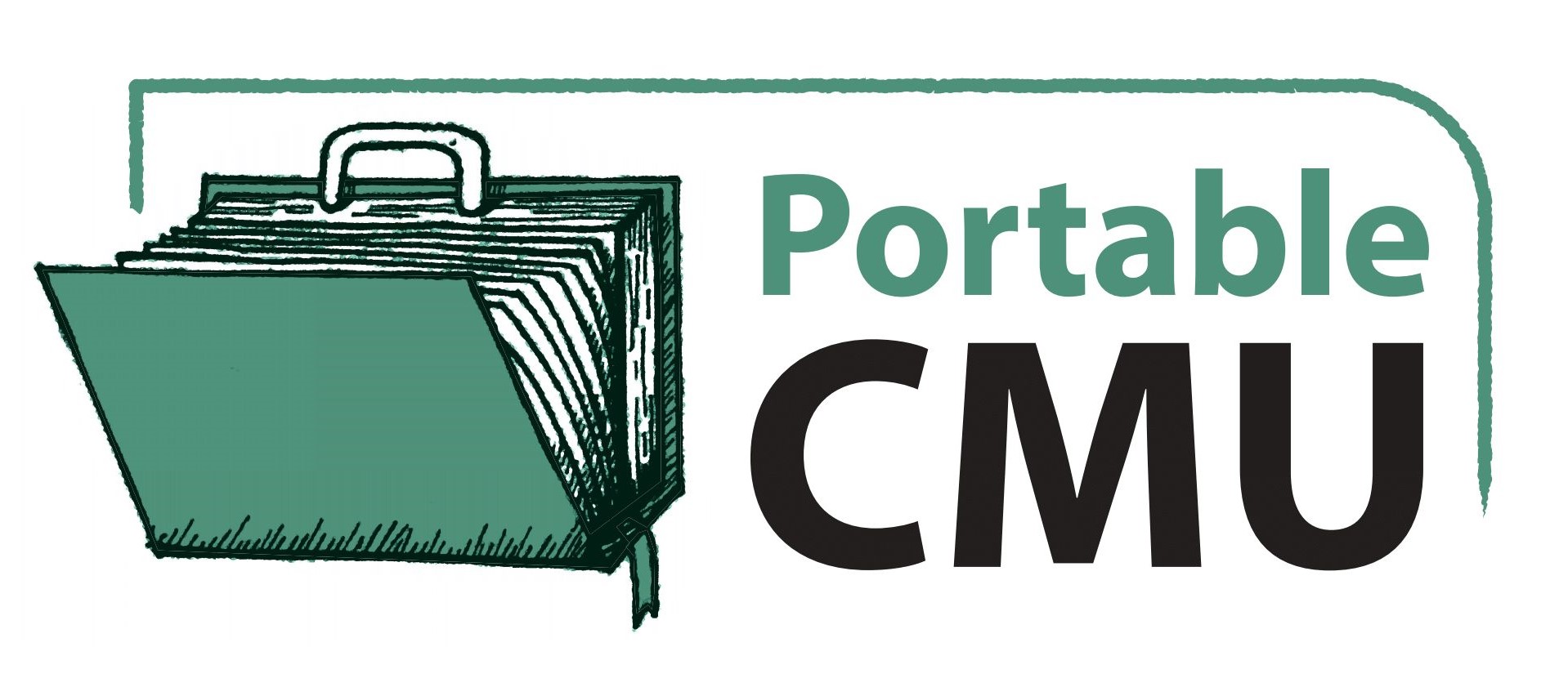
Portable CMU is intended to nurture the vocation of the church. Through this program, CMU is committed to resource congregations as they seek to strengthen their congregational life, witness, and mission.
CMU faculty are available to preach a sermon, teach an adult education class, lead a longer course (up to three sessions), or a combination of these.
After the course descriptions you can find Portable CMU Options, Portable CMU Costs and contact information for inquiries and bookings.
Portable CMU
John Brubacher | Associate Professor of Biology
Not available for Portables in 2025/2026.
What is a human? Biological and theological perspectives

Contemporary Christians can be forgiven for feeling squeezed between a rock and a hard place: on one hand, we read in scripture that humans were created separately from all other animals, in the image of God, with encouragement to fill the earth and have dominion over it (Gen 1:26-28). In a nutshell, we are special (Psalm 8). On the other hand, evolutionary theory (theoretical in the same sense as germ theory and atomic theory) tells us that humans are recent arrivals, descended from non-human life forms, and cousins to all other living creatures. Furthermore, our life on a planet that we have indeed filled and at least partly tamed feels precarious these days—given climate change, pandemics, species extinctions, and the accelerating development of artificial intelligence. Is it possible to be an intellectually satisfied, theologically and scientifically literate Christian any more? I think so—let’s talk about the possibilities.
Paul Doerksen | Associate Professor of Theology
Not available for Portables in 2025/2026; available for occasional sermons or adult education.
Reading as Spiritual Practice

Reading plunges us into a spiritual paradox, reminding us of our isolation and our connection to others and to God (Daniel Coleman). If this is true, reading literature as well as religious writing, done with ‘intelligent charity,’ should be understood as a spiritual discipline with edifying possibilities for a shared life of Christian faith. To that end, this Portable considers the practice of working with words in the light of faith.
In the Patience of Love's Delay

Patience is used to describe both as one of the perfections of God and as a virtue that should be cultivated by Christians. This Portable will examine (with gratitude) God’s patience with the created world, including humans, and then explore the practice of Christian patience, which is not simply an attempt to mimic God’s patience. We will look especially at questions such as the importance of avoiding passivity in the pursuit of patience. In addition, we will ask whether patience must always be slow, and whether waiting is faithful action.
Dan Epp-Tiessen | Emeritus Associate Professor of History
Reading the Bible in Light of Same-Sex Relationships

Many congregations desire sound Biblical reflection and honest conversation about human sexuality, particularly given the church’s strain related to LGBTQ questions and issues. Dan has addressed these themes from various perspectives and in different contexts. He is willing to walk with congregations in a session or workshop format focused on how understandings of scripture, confessions of faith, the church, family, relationships, and gender can inform our own convictions and questions about sexuality.
Surviving and Thriving Despite Cancer (and other major life crises)

Dan and his wife Esther are both double cancer survivors, and they had a son, Tim, who did not survive cancer. Dan shares stories of what it is like to be a family that “does” cancer, and he explores the biblical and faith resources that have sustained him and Esther, and helped them not only survive but thrive, despite their journeys with cancer, loss, and grief. Dan’s hope is that these biblical and theological resources will comfort and strengthen persons who are hurting and will prepare others for the pain and struggle that come with the territory of being human.
Creation, Ecology, and the Bible

Human-caused ecological destruction is the greatest threat currently facing the planet and its many life forms. This session explores a variety of biblical texts that can inspire respect and proper care for God’s magnificent creation. Some of the topics covered include: what kind of world does God create and what are the implications for human action; creation’s praise of God and God’s delight in creation; Jesus as the Cosmic Christ through whom God brings healing not just to humans but to all of creation; why do many Christians believe the Bible teaches that creation is expendable and merely a backdrop to the divine-human relationship.
Brian Froese | Associate Professor of History
Mennonites in Canada since 1970

Description to come.
Gerald Gerbrandt | President Emeritus & Professor Emeritus of Bible
Joyful Wrestling: The Art of Reading Scripture

It is the faith of the church that through Scripture God speaks to us. But all too often when we read Scripture, we hear ourselves rather than God. A fundamental need in the church today is to learn again how to read Scripture. The church must learn “afresh to acknowledge the Bible as the functional center of life, so that in all our conversations, deliberations, arguments, and programs, we are continually reoriented to the demands and promises of the Scriptures.” (Ellen Davis). This session will consider what factors and assumptions undermine hearing the God of Scripture, and how we might read it again with integrity and effect, keeping in mind two themes: 1) that reading the Bible can be a delight and joy, and 2) that at the same time, it inevitably is a struggle or wrestling match.
Denominations: Who Needs Them?

Denominations have become a standard feature of North American church reality, mediating between the local congregation and the global church. In this session, questions like the following will be considered: Are denominations a necessary element of church life, with a positive role to play? Or are they a distraction and waste, weakening the larger mission of the church? What are the strengths and weaknesses of placing primary emphasis on the local congregation?
Who are "We"? - Mennonites and Anabaptists within a Global Church

More information to come.
Pierre Gilbert | Associate Professor of Bible and Theology
Cultivating a Biblical Worldview

How can those who have to spend most of their time in the world remain faithful to Christ? By cultivating a biblical worldview. In this session, we will examine three topics that are fundamental to developing a Christian mindset: 1) The trustworthiness of Scripture and the challenge of scientism (Genesis 1:1); 2) human dignity (Genesis 1:26-27; Psalm 8); 3) the importance of gratitude and joy as a way of life (Psalm 84).
God Never Meant for Us to Die: The Emergence of Evil in the Light of the Genesis Creation Account

The most incisive indictment against Christianity resides in the notion of a God who created a world in which there is untold suffering and death. Is this the best God could do? In response, most Christians will mutter something about free will or the necessity of evil to bring about God’s plan for humanity. Theologians often reply by challenging the very legitimacy of the question: God only requires that we persevere. Biblical scholars, who might otherwise be expected to offer a scriptural perspective, nervously denounce any suggestion that the presence of evil may have had something to do with a primordial couple and a fruit tree. Is it any wonder that most people believe that evil must surely be an intractable component of human existence introduced, perhaps, by the very God Jews and Christians worship? In this session, I propose a response to the problem of evil that unconditionally affirms the goodness and power of God. I contend, based on a new assessment of the Genesis creation account, that God never intended for humanity to experience suffering and death.
The Prophets of Israel: The Lord’s Firefighters

The most challenging and confusing books of the Old Testament must certainly be the prophets. And for good reason. Unlike the psalms or the wisdom books, which can generally be accessed with relative ease, the interpretation of the prophetic books is greatly dependent on a basic understanding of the overall prophetic genre, the forms of speech used in these writings, and the historical context of the books. In this session, we will examine the prophetic literature of the Old Testament in the light of its cultural and historical context. While we will explore the relevance of the prophetic discourse for the Christian community, we will also give special attention to the possible implications of these texts for a postmodern and secular culture.
Choosing the Way of Life in an Age of Freedom: The Wisdom

How can we communicate the Christian faith in a society where most people no longer recognize the authority of Scripture and tend to be cynical of organized religion?
The wisdom books of the Old Testament (Job, Prov., Eccles., and the Song of Solomon) can provide a fresh perspective on that question. Wisdom writings were intentionally designed to address an audience, which like today, was faced with a multiplicity of options, was cynical towards the faith, and would not be coerced by tradition. In this respect, wisdom teachers did not attempt to impose an opinion, but extended a vibrant invitation to consider what gives significance to human existence from the perspective of faith.
To a generation like ours that is struggling with purpose and meaning, the wisdom books offer a wonderful way to discover the Way of Life that is to be found only in Jesus Christ the power and the wisdom of God.
The Problem of Evil

The most incisive indictment against Christianity resides in the notion of a God who created a world in which there is untold suffering and death. Is this the best God could do?
In response, most Christians will mutter something about free will or the necessity of evil to bring about God’s plan for humanity. Theologians often reply by challenging the very legitimacy of the question: God only requires that we persevere. Biblical scholars, who might otherwise be expected to offer a scriptural perspective, nervously denounce any suggestion that the presence of evil may have had something to do with a primordial couple and a fruit tree.
Is it any wonder that most people believe that evil must surely be an intractable component of human existence introduced, perhaps, by the very God Jews and Christians worship?
In this portable, I propose a response to the problem of evil that unconditionally affirms the goodness and power of God. I contend, based on a new assessment of the Genesis creation account, that God never intended for humanity to experience suffering and death.
The Problem of Prayer

Prayer can be a very confounding practice. Why do we pray? Why do we often have the impression that God doesn’t answer our prayers? Does prayer really make a difference? We will explore this question by first examining the Lord’s Prayer as found in Matthew 6:9-13. Second, we will look at the flipside of the issue and consider what happens when God does indeed answer our prayers, but in ways we didn’t expect. Habakkuk, a seventh-century prophet, once received an answer to an urgent prayer. But God’s response shocked him—beware what you pray for. Matthew 6:9-13 and the book of Habakkuk will provide a foundation for understanding more adequately the nature of prayer and will give us some insights into the basic principles we need to consider as we anticipate God’s response.
The Martyr’s Mirror is arguably the most well-known book in the Anabaptist tradition. But while many are familiar with a story or two, few contemporary Mennonites have explored the entire book. This Portable will embark on such an exploration—taking a look at what’s in this big book and what’s not as well as a number of other things in between.
Chris Huebner | Associate Professor of Theology and Philosophy
Exploring the Martyr's Mirror

The Martyr's Mirror is arguably the most well-known book in the Anabaptist tradition. But while many are familiar with a story or two, few contemporary Mennonites have explored the entire book. This Portable will embark on such an exploration—taking a look at what’s in this big book and what’s not as well as a number of other things in between.
Sheila Klassen-Wiebe | Associate Professor of New Testament
Not available for Portables in 2025/2026.
The Good News According to Luke

All four Gospels tell the story of Jesus. This session will look at Luke’s distinctive version of that story, with attention to several of the Gospel’s characteristic themes and unique texts. We will explore Luke’s understanding of the salvation 7 Jesus brings, Jesus’ practice of table fellowship, and the Gospel’s strong emphasis on discipleship and wealth. Depending on the season of the church year and congregational interest, we could also explore Luke’s distinctive presentation of Jesus’ birth, His death, or His resurrection. Our study will lead us to a renewed appreciation for the significance of Luke’s portrait of Jesus for the church today.
A Living Faith: Discipleship and the Letter of James

Even though Martin Luther called the letter of James an "epistle of straw," this book of the Bible continues to be a favourite for many Christians. With its vivid imagery and straightforward instruction, the letter of James makes Christian faith practical and relevant for daily life. And yet, living out the vision of Christian discipleship set out by James is anything but easy or simple. Many Christians wrestle with where to find grace and where to find Jesus in this short instructive letter. In this session we will begin with an overview of the book and a look at its historical context and literary background. Most of our time will be spent studying some of the following key themes in the letter: speech, perfection, wisdom, friendship with God, anger, wealth, and faith in action. Our aim will always be to reflect on how this letter can and does shape faithful Christian discipleship today. In the process we will find Jesus in the letter as well!
Karl Koop | Professor of History and Theology
Anabaptism Reconsidered: Stories of Reckoning, Stories of Hope 

In 2025, Anabaptist communities around the world had the opportunity to commemorate Anabaptism’s 500 years of existence. There has been much to consider given the evolving nature of the tradition and its geographical reach. The Anabaptist movement began in Europe but eventually also found footing in North America and the Global South. In examining this historical development, recent scholarship has called attention to stories of highs and lows, of courage and controversy. If the Anabaptist tradition can be an instrument for renewal, what stories might speak meaningfully for our time?
Cheryl Pauls, President of CMU
Cheryl is available to preach and/or lead an adult education time.
In 2022, CMU Press, under the direction of Dr. Sue Sorensen, published Return Stroke: essays & memoir, a book of creative non-fiction by fiction author and lay historian Dora Dueck. Within Return Stroke, one theme in particular resonates—change. Dueck writes: “When I send inquiry into my past, it sends something back to me.” Both Dora Dueck and Sue Sorensen are novelists and have worked closely together as writer and editor on several projects. This portable offers a public engagement between the two authors on themes such as the variety of ways stories insist on being told, how past and present shape each other in the writing of our personal histories, and how curiosity and imagination can enrich a Christian life. They can also speak about the various topics within Return Stroke (motherhood, mortality, the ethics of biography) as well as the process of shaping Dueck’s memoir of her family’s 1980s life in the Paraguayan Chaco.
This portable is available to congregations in southern BC and Alberta and offered in-person. It is expected that participants will acquire copies of Return Stroke, offered by CMU Press at a group discount, and become familiar with the book before the presentation.
Conrad Stoesz | Archivist, Mennonite Heritage Archives
Conscientious Objection

More information coming soon.
The Archives and the Power of Story

More information coming soon.
Touring Anabaptist Sites

If you can't make it to Europe to see the Anabaptist sites, consider this presentation which uses pictures (power point) and story telling to trace the footsteps of Anabaptist beginnings. We start in Switzerland and move north into Germany and the Netherlands.
Portable CMU Options
Portable CMU sessions can be offered in an in-person or virtual format. Options may include:
- Preach a stand alone sermon (may include a topic chosen by the church in consultation with the faculty).
- Teach an Adult Education class.
- Preach and Teach on the same day.
- Lead up to three sessions (one hour each) offered over a week, on a weekend, or over three weeks.
- A combination of the above.
Portable CMU Cost
- $125 per session (sermon, adult education class, one course session are each considered a session)
- Churches cover transportation, housing, and meal costs.
Inquiries and Booking
For further information, to inquire about reserving a faculty, or to speak with a faculty member, contact Hilda Nikkel at portableCMU
Once initial contact is made, congregations will be in direct conversation with the faculty member who is offering the sermon or Portable. Faculty want to take into account the particular needs and interests of your congregations in ways that are also feasible for themselves.
Contact us early as some offerings are in high demand. We welcome bookings both by individual congregations and by two or more congregations working together.



 Print This Page
Print This Page